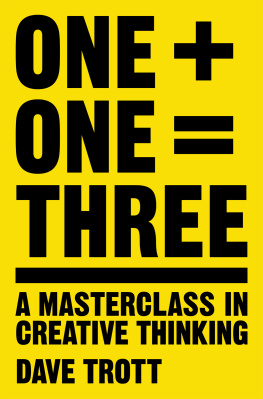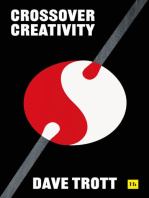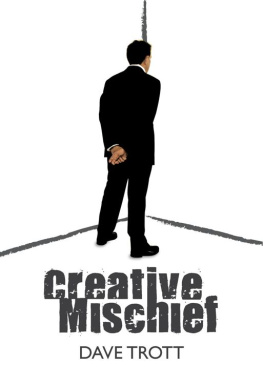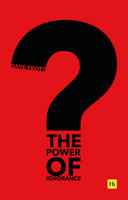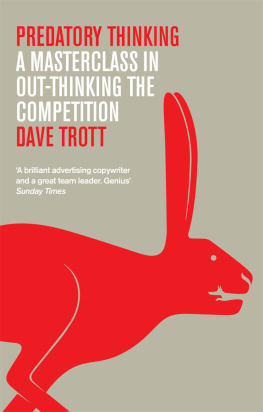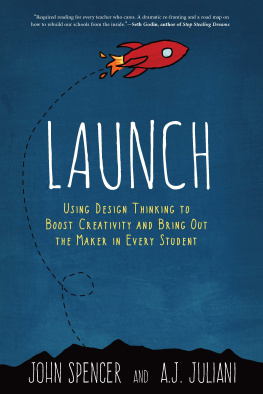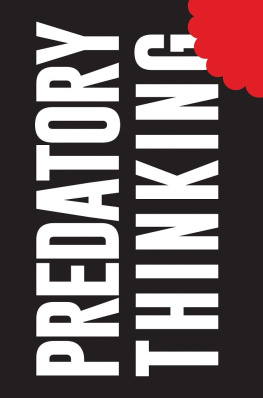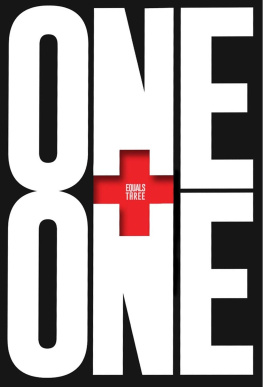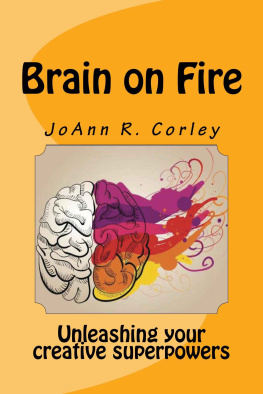DAVE TROTT ONE PLUS ONE EQUALS THREE A MASTERCLASS IN CREATIVE THINKING PAN BOOKS CONTENTS INTRODUCTION: WHY ONE PLUS ONE EQUALS THREE A few years ago I read an interview with Steve Jobs. Steve said any new idea is nothing more than a new combination of old elements. He said the ability to make those new combinations depends on our ability to see relationships. Thats what makes some people more creative. They are better at spotting those connections, better at recognizing possible relationships. They are able to do this because theyve had more experiences, or thought more about those experiences, than other people.
They are better at connecting the dots because they have more dots to connect. Steve said that this was the problem in the creative industries. Most people havent had diverse experiences. They may know a lot, but only about a very narrow field. So they dont have enough dots to connect. And so they end up with predictable, linear solutions.
One of the best advertising people ever was Carl Ally. He said the true creative person wants to be a know-it-all. They want to know about all kinds of things: ancient history, nineteenth-century mathematics, modern manufacturing techniques, flower arranging, and lean hog futures. Because they never know when these ideas might come together to form a new idea. It may happen six minutes later or six years down the road, but they know it will happen. Thats been part of my purpose in this book.
The more varied the input, the more unexpected the combinations, the more creative the ideas. As Steve Jobs said: the broader our understanding of human experience, the more dots we will have to connect, the more creative our ideas will be. Similarly, years ago I read a book by an Indian mathematics professor. She wrote that its possible to greatly increase the amount of brain we use. But not in the conventional way. In fact, in exactly the opposite way.
The secret again is connections. Conventionally, people just learn more stuff. They learn more stuff about whatever theyre interested in. She said this kind of learning made for small, slow growth in brain usage. Because we are simply adding to the store of what we already know. But if new ideas are new combinations of existing ideas, the more connections we can create, the more ideas we can generate.
Thats why the professor said, for real growth, we need to identify the areas were not naturally interested in. Then we need to investigate those areas. This massively multiplies the amount of new connections we can make with our existing store of knowledge. Because its no longer predictable, now its original and surprising. Because each connection will be a new connection with everything else we know. So our creativity is directly related to how many connections we are able to make.
Which is directly related to how much new and unusual stuff we expose our minds to. Which is the point of this book. Under the old system 1 + 1 = 2 Under the new system 1 + 1 = 3 PART ONE REGRET IS WORSE THAN EMBARRASSMENT WHAT EXISTS BEATS WHAT DOESNT In 1988, Nicholas Wintons wife was going through their attic. She came across a scrapbook. In it were hundreds and hundreds of names and addresses. Shed never seen them before.
She asked her husband what they were. Then he told her this story. In 1938, Nicholas Winton was going skiing in Switzerland. When Kristallnacht happened. In a night of violence, mass attacks were organized against Jews all over Germany. Jewish homes, hospitals and schools were looted and burned.
Over 1,000 synagogues and 7,000 businesses were destroyed. Nearly 100 people were murdered and 30,000 were arrested and sent to concentration camps. It was the start of the Nazis campaign to systematically destroy the Jewish race. Nicholas Winton had friends in Prague. He cancelled his skiing trip and went there instead. It was obvious Germany would invade Czechoslovakia next and every Jewish person there would be exterminated.
Families were desperate to save their children. The British government had agreed to allow unrestricted immigration of refugee Jewish children. All they needed was fifty pounds each and a place to stay. Nicholas Winton decided to take action. He set up an office in the dining room of his hotel in Prague. Made lists of hundreds of children he would help escape the Nazis.
Then he travelled back to Britain to arrange the money and the homes. He arranged for 669 children to escape to Britain. Children who wouldnt otherwise have survived. We know this because, after the children left, their parents perished in the concentration camps. Nicholas Winton never mentioned it to anyone because he felt frustrated that he hadnt done more. Later, in 1988, he was in the audience at the recording of a TV programme.
Suddenly the host began talking about Nicholas Winton. She introduced the lady next to him. The lady, now in her fifties, was one of the children he had saved. The lady said thank you, over and over again. She kissed his hand and held it to her cheek. And he had to wipe his eye as the good he had done became real to him in human terms.
Then the host asked if there was anyone else in the audience who owed their life to Nicholas Winton. And the entire audience stood up. People who had families of their own: wives, husbands, children, grandchildren. And Nicholas Winton didnt quite know what was happening. First he looked to one side, then the other, and then behind him. Then he stood up and looked all around him.
And he couldnt believe it. The entire audience, every single person in the TV studio, was standing up, smiling and thanking him. Physicists, surgeons, authors, artists, politicians, journalists, architects, filmmakers, lawyers, businessmen, teachers. Hed saved the life of every single person in the theatre. And Nicholas Winton finally got it. Forget what you havent done.
Its what you have done that matters. WHAT ARENT THEY DOING? David Geffen was Jewish. He was born in Brooklyn. But he wanted to go live among the beautiful people, so when he was 18 he moved to LA. The trouble was, he wasnt any good at anything, and he got fired from every single job. He was talking to a struggling actor about this.
The actor said, You cant do anything? You should be an agent, they dont do anything. Geffen took him seriously; he got a job at the William Morris Agency. He got a job in the mailroom, and he had to lie to get it. On his CV he said he had a degree from UCLA. He figured it didnt matter, no one would check. Then he found out the guy working next to him had just been fired for claiming hed graduated from CCNY on his CV.
So they did check. Luckily Geffen was in the mailroom, so he got in early every morning and went through the mail. A few weeks later he intercepted the letter from UCLA. He steamed it open and changed one word. He changed David Geffen never graduated from UCLA to David Geffen recently graduated from UCLA. Plus his boss thought he was a good example, starting work early every day, so he raised Geffens salary.
While Geffen was delivering the office mail he watched what the agents did. He thought, All they do is bullshit on the phone all day. I can do that. I can bullshit on the phone. Its a well-known fact that guys from Brooklyn are better at bullshitting than anyone else. And he noticed what they were doing was trying to sign established acts.
This made no sense. Established acts were more expensive, and competition to sign them was greater. To Geffen it made sense to find the acts before they were established. So thats what he did. While all the other agents were at home with their families, Geffen would go to clubs and bars and find talent before anyone else. Hed sign people who didnt already have agents.
And he became the most successful agent at William Morris. He was so good that he opened his own record label by the time he was 27: Asylum Records. The artists he made famous on this label included Neil Young, Crosby, Stills and Nash, the Eagles, Joni Mitchell, Jackson Browne, Tom Waits, Elton John, Judee Sill. Asylum produced some of the best, and bestselling, records of the 1970s. In 1972 he sold the company, and eventually he left. Five years later he opened Geffen Records.
Next page
